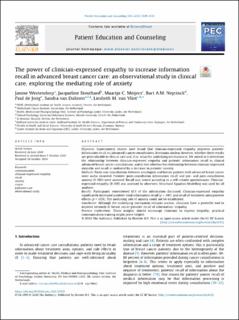| dc.contributor.author | Westendorp, Janine | |
| dc.contributor.author | Stouthard, Jacqueline M. L. | |
| dc.contributor.author | Meijers, Maartje C. | |
| dc.contributor.author | Neyrinck, Bart A. M. | |
| dc.contributor.author | de Jong, Paul | |
| dc.contributor.author | van Dulmen, Sandra | |
| dc.contributor.author | van Vliet, Liesbeth M. | |
| dc.date.accessioned | 2021-05-20T12:00:44Z | |
| dc.date.available | 2021-05-20T12:00:44Z | |
| dc.date.created | 2021-02-26T11:03:57Z | |
| dc.date.issued | 2020 | |
| dc.identifier.citation | Westendorp, J., Stouthard, J., Meijers, M. C., Neyrinck, B. A. M., de Jong, P., van Dulmen, S., & van Vliet, L. M. (2021). The power of clinician-expressed empathy to increase information recall in advanced breast cancer care: an observational study in clinical care, exploring the mediating role of anxiety. Patient Education and Counseling, 104(5), 1109-1115. | en_US |
| dc.identifier.issn | 0738-3991 | |
| dc.identifier.uri | https://hdl.handle.net/11250/2755874 | |
| dc.description.abstract | Objective: Experimental studies have found that clinician-expressed empathy improves patients’ information recall in (advanced) cancer consultations. It remains unclear, however, whether these results are generalizable to clinical care and, if so, what the underlying mechanism is. We aimed to i) determine the relationship between clinician-expressed empathy and patients’ information recall in clinical advanced breast cancer consultations; and ii) test whether the relationship between clinician-expressed empathy and recall is mediated by a decrease in patients’ anxiety.
Methods: Forty-one consultations between oncologists and female patients with advanced breast cancer were audio recorded. Patients’ post-consultation information recall and pre- and post-consultation anxiety (0-100) were assessed. Recall was scored according to a self-created questionnaire. Clinician-expressed empathy (0-100) was assessed by observers. Structural Equation Modelling was used for all analyses.
Results: Participants remembered 61% of the information discussed. Clinician-expressed empathy significantly increased patients’ total information recall (p = .041) and recall of treatment aims/positive effects (p = .028). The mediating role of anxiety could not be established.
Conclusion: Although the underlying mechanism remains unclear, clinicians have a powerful tool to improve seriously ill breast cancer patients’ recall of information: empathy.
Practice implications: These insights should encourage clinicians to express empathy; practical communication training might prove helpful. | en_US |
| dc.language.iso | eng | en_US |
| dc.rights | Navngivelse 4.0 Internasjonal | * |
| dc.rights.uri | http://creativecommons.org/licenses/by/4.0/deed.no | * |
| dc.title | The power of clinician-expressed empathy to increase information recall in advanced breast cancer care: an observational study in clinical care, exploring the mediating role of anxiety | en_US |
| dc.type | Journal article | en_US |
| dc.type | Peer reviewed | en_US |
| dc.description.version | publishedVersion | en_US |
| dc.rights.holder | © 2020 The Author(s). | en_US |
| dc.source.pagenumber | 1109-1115 | en_US |
| dc.source.volume | 104 | en_US |
| dc.source.journal | Patient Education and Counseling | en_US |
| dc.source.issue | 5 | en_US |
| dc.identifier.doi | https://doi.org/10.1016/j.pec.2020.10.025 | |
| dc.identifier.cristin | 1893986 | |
| cristin.ispublished | true | |
| cristin.fulltext | postprint | |
| cristin.qualitycode | 2 | |

